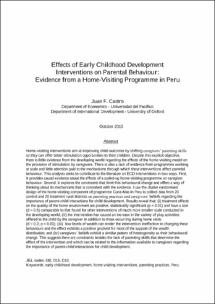| dc.contributor.author | Castro, Juan Francisco | |
| dc.date.accessioned | 2016-07-01T21:41:37Z | |
| dc.date.available | 2016-07-01T21:41:37Z | |
| dc.date.issued | 2015 | |
| dc.identifier.uri | http://hdl.handle.net/11354/1109 | |
| dc.identifier.citation | Castro, J. F. (2015). Effects of early childhood development interventions on parental behaviour: Evidence from a home-visiting programme in Peru. Universidad del Pacífico, Centro de Investigación. Recuperado de http://hdl.handle.net/11354/1109 | es_PE |
| dc.description.abstract | Las visitas a domicilio tienen por objeto mejorar los resultados del niño, desplazando las habilidades de crianza de los cuidadores para que puedan ofrecer mejores oportunidades de estimulación a sus hijos. A pesar de este objetivo explícito, hay poca evidencia de países en desarrollo con respecto a los efectos del modelo de visitas a domicilio, en la provisión de la estimulación por los cuidadores. También hay una falta de pruebas de los programas de trabajo a gran escala y poca atención a los mecanismos mediante los cuales estas intervenciones afectan al comportamiento de los padres. Este análisis tiene por objeto contribuir a la literatura sobre las intervenciones de dos maneras. Primero, proporciona evidencia causal sobre los efectos de un programa de visitas a domicilio envergadura sobre el comportamiento del cuidador. En segundo lugar, se explora las restricciones que limitan este cambio de comportamiento y ofrece una forma de pensando en sus mecanismos que es consistente con la evidencia. Yo uso el aleatorio grupal diseño del componente de visitas al hogar del programa Cuna Más en Perú para recoger datos de 20 de control y de tratamiento de 20 distritos rurales sobre las prácticas de crianza y las creencias de los cuidadores en cuanto a la importancia de las interacciones entre padres e hijos para el desarrollo infantil. | es_PE |
| dc.description.abstract | Home-visiting interventions aim at improving child outcomes by shifting caregivers’ parenting skills so they can offer better stimulation opportunities to their children. Despite this explicit objective, there is little evidence from the developing world regarding the effects of the home-visiting model on the provision of stimulation by caregivers. There is also a lack of evidence from programmes working at scale and little attention paid to the mechanisms through which these interventions affect parental behaviour. This analysis seeks to contribute to the literature on ECD interventions in two ways. First, it provides causal evidence about the effects of a scaled-up home-visiting programme on caregiver behaviour. Second, it explores the constraints that limit this behavioural change and offers a way of thinking about its mechanisms that is consistent with the evidence. I use the cluster-randomised design of the home-visiting component of programme Cuna Mas in Peru to collect data from 20 control and 20 treatment rural districts on parenting practices and caregivers’ beliefs regarding the importance of parent-child interactions for child development. Results reveal that: (i) treatment effects on the quality of the home environment are positive, statistically significant (p < 0.01) and have a size (d = 0.5) comparable to that found for other interventions of much more smaller scale conducted in the developing world; (ii) the intervention has caused an increase in the variety of play activities offered to the child by the caregiver in addition to those occurring during home visits (d = 0.3; p < 0.01); (iii) low levels of wealth can render the intervention ineffective in changing these behaviours and the effect exhibits a positive gradient for most of the support of the wealth distribution; and (iv) caregivers’ beliefs exhibit a similar pattern of heterogeneity as their behavioural change. This suggests there are constraints besides the lack of parenting skills that determine the effect of the intervention and which can be related to the information available to caregivers regarding the importance of parent-child interactions for child development. | en |
| dc.format | application/pdf | es_PE |
| dc.language.iso | eng | es_PE |
| dc.publisher | Universidad del Pacífico. Centro de Investigación | es_PE |
| dc.relation.ispartofseries | Documento de discusión;1507 | |
| dc.rights | info:eu-repo/semantics/openAccess | es_PE |
| dc.rights | Atribución-NoComercial-SinDerivadas 4.0 Internacional | * |
| dc.rights.uri | http://creativecommons.org/licenses/by-nc-nd/4.0/deed.es | * |
| dc.source | Repositorio de la Universidad del Pacífico - UP | es_PE |
| dc.source | Universidad del Pacífico | es_PE |
| dc.subject | Desarrollo infantil | es_PE |
| dc.subject | Trabajo social con niños | es_PE |
| dc.subject | Crianza de niños | es_PE |
| dc.title | Effects of early childhood development interventions on parental behaviour: evidence from a home-visiting programme in Peru | es_PE |
| dc.type | info:eu-repo/semantics/workingPaper | es_PE |
| dc.publisher.country | Perú | es_PE |


